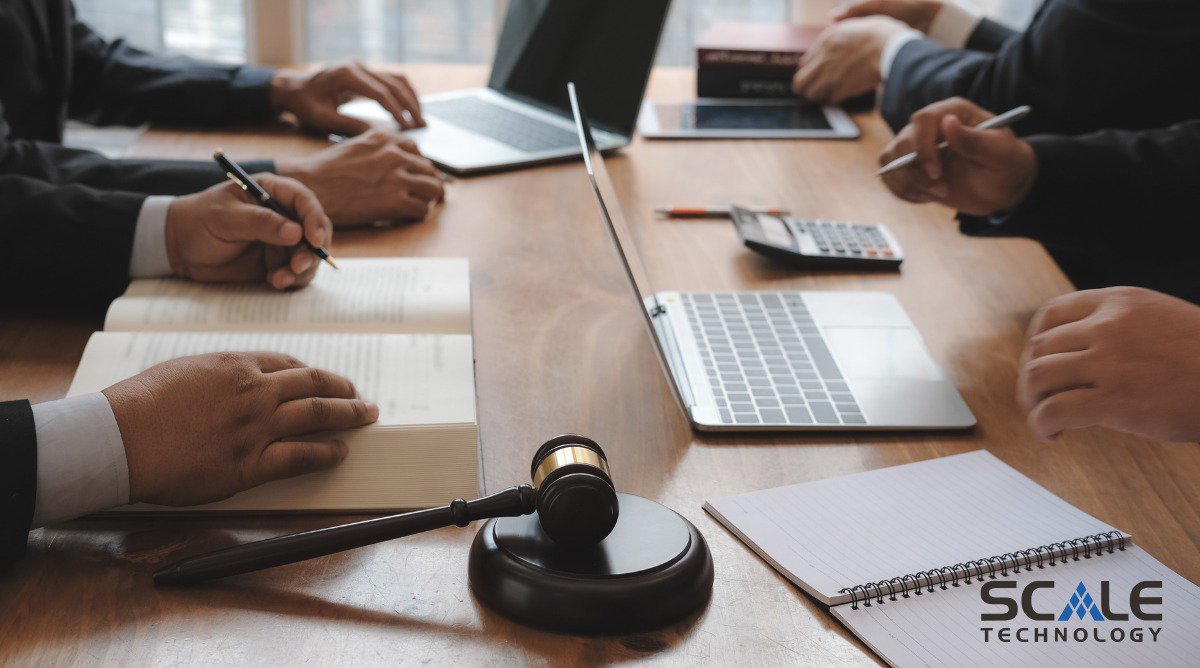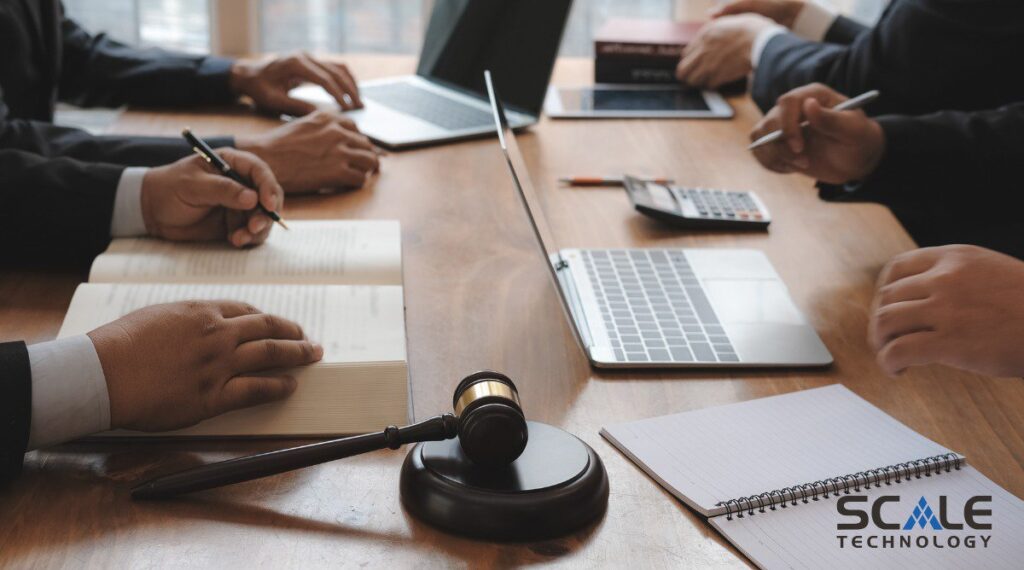If you run a law firm, you have a duty to protect client data. That means more than locking your office door—it means real cybersecurity for law firms, designed with legal protection in mind. Data loss, client trust, and legal fines are all at stake. If you think your firm is secure. Think again.
Key Takeaways:
- ABA Rule 1.6 requires "reasonable efforts" to protect client data; violations can lead to ethics charges or lawsuits.
- Cybersecurity is a professional duty connected to client trust and legal compliance.
- Common threats to law firms include phishing, ransomware, data leaks, and lost/stolen devices.
- Phishing is the top attack method; ransomware can halt operations and ruin a reputation.
- Firms should conduct annual risk assessments, penetration testing, and monthly vulnerability scans.
- Strong practices include encrypted tools (Clio, NetDocuments), MFA, firewalls, and email filters.
- Staff training must be ongoing and include mock phishing tests and clear cybersecurity manuals.
- Breach response includes isolating systems, investigating, notifying clients, and updating plans.
- HIPAA, GDPR, CCPA, and PCI require data protection and breach notification policies.
- Cyber insurance covers breach costs; vendor management reduces third-party risks.
- Small firms should focus on 2FA, strong passwords, regular updates, and VPN use.

Cybersecurity for Law Firms: A Legal and Ethical Imperative
In today's legal landscape, cybersecurity for law firms is more than a best practice—it's an ethical, legal, and operational necessity. Legal professionals handle extremely sensitive data, including confidential client communications, health records, and financial transactions. As cyber threats grow increasingly sophisticated, the responsibility that law firms carry becomes even more urgent. Fortunately, building a secure practice begins with understanding your obligations. Moreover, implementing practical and scalable safeguards ensures comprehensive protection.
Law Firms Have Clear Cybersecurity Obligations to Protect Client Data
Law firms are bound by professional ethics to protect client confidentiality. According to the ABA Model Rule 1.6, attorneys must take reasonable efforts to prevent unauthorized access to or disclosure of client information. While the term "reasonable" varies depending on the firm’s size, technology, and data types, the core message is clear: you must act to protect what your clients entrust to you.
For instance, if you manage health data, compliance with HIPAA is non-negotiable. Similarly, firms working with clients in California must meet CCPA standards, while those interacting with European citizens must adhere to GDPR. Regardless of the jurisdiction, ethical rules consistently demand proactive cybersecurity practices.
Cybersecurity Is a Professional Duty
Because technology underpins nearly all legal work today, safeguarding it is part of your professional role. The ABA Model Rule 1.1 requires attorneys to maintain competence, including technological competence. Therefore, lawyers must recognize and mitigate cyber risks. In today's interconnected world, saying, “I didn’t know,” is no longer a viable defense against data breaches. Furthermore, cybersecurity for law firms isn’t just about IT—it’s fundamentally about trust. Indeed, a single breach can severely damage your reputation, potentially lose clients, and consequently trigger lawsuits or ethics violations.
Confidentiality, Ethics, and Malpractice: The Direct Connection
If a data breach occurs because of negligence—say, an unencrypted email or a weak password—the consequences go far beyond embarrassment. You may face malpractice claims, ethics board investigations, or even disbarment. Simply put, cybersecurity for law firms protects not only your data but your license.
For practical guidance, the ABA Cybersecurity Handbook offers detailed strategies for legal professionals to manage risks while remaining compliant.
Law Firms Face Escalating Threats to Cybersecurity
Because law firms store high-value data, they're prime targets for cyberattacks. Common threats include:
- Phishing emails, where attackers impersonate clients or courts
- Ransomware, which locks systems until payment is made
- Data leaks, often due to unsecured devices or cloud services
- Weak passwords, especially reused or outdated credentials
The Grubman Shire Meiselas & Sacks breach is a cautionary tale—hackers demanded $42 million and threatened to release confidential files.
Even small firms are vulnerable because hackers are increasingly using AI to create smarter phishing campaigns and guess passwords faster. As a result, these sophisticated attacks pose a significant threat to firms of all sizes. Consequently, it's essential for small practices to implement robust cybersecurity measures. Moreover, staying informed about the latest threats helps in adapting strategies effectively. Ultimately, taking proactive steps can safeguard your firm's sensitive data against these evolving cyber risks.
Ransomware Shuts Down Legal Operations
When ransomware hits, your systems go offline. You lose access to files, emails, and essential apps. Moreover, if you don’t have reliable backups, you may never recover that data. Consequently, court deadlines can be missed, and client confidence may vanish overnight. Therefore, cybersecurity for law firms must include ransomware prevention and recovery plans.
Phishing Scams Exploit Legal Workflows
Lawyers and staff handle dozens—if not hundreds—of emails daily. Consequently, hackers take advantage of this by sending fake forms or court documents that seem legitimate. As a result, clicking a single link can compromise an entire network. Therefore, it is crucial to have robust cybersecurity measures in place.
In real estate law, for example, phishing may involve fake wire transfer instructions. If staff aren’t trained to verify before acting, client funds may be irreversibly stolen.
Proactive Cybersecurity Defense for Law Firms Begins With Risk Assessment
Knowing your risk is the first step to improving cybersecurity for law firms. A thorough assessment should include:
- Reviewing software, devices, and cloud tools
- Auditing who has access to what
- Testing password strength and backup systems
- Evaluating communication practices like file sharing and email habits
The ABA’s data breach report shows that one in four firms has experienced a breach. That’s not a hypothetical risk—it’s a reality.
Penetration Testing and Vulnerability Scans Are Essential in Cybersecurity for Law Firms
At least once a year, firms should conduct penetration testing to simulate attacks and identify weak spots. Monthly vulnerability scans are even better, as they catch issues before hackers can exploit them.
Additionally, third-party audits offer a fresh perspective. They help uncover overlooked risks, ensure compliance with complex regulations like HIPAA, and provide proof to clients that your firm takes data security seriously.
Best Cybersecurity Practices for Law Firms to Protect Confidential Client Information
Data security tools matter. But your firm also needs policies and habits that reinforce secure behavior.
Choose Legal-Specific File-Sharing Tools
Use tools like Clio, NetDocuments, or ShareFile that offer encryption at rest and in transit. This ensures that, even if data is intercepted or stolen, it can’t be read.
Set Strong Password and MFA Policies
Create passwords with:
- 12+ characters
- A mix of letters, numbers, and symbols
- No reuse across platforms
Require multi-factor authentication (MFA) on all systems. Indeed, according to the FBI, MFA can block up to 99% of password-based breaches. Therefore, implementing MFA is an essential step in enhancing your cybersecurity posture.
Encrypt Everything
Encryption is a “reasonable effort” under ABA rules. It’s also required under HIPAA and GDPR. Make sure both stored and transmitted data are encrypted using NIST-compliant tools.
Cybersecurity Tools and Policies All Law Firms Should Implement
To build a strong foundation for cybersecurity for law firms, use:
- Firewalls to block unauthorized access
- Email filters to catch phishing attempts
- Endpoint protection for all devices
- Intrusion detection tools with real-time alerts
Combined, these tools reduce entry points and strengthen your overall security posture.
Train Staff Year-Round
Your greatest defense is a well-trained staff. To begin with, conduct regular phishing simulations. Additionally, teach employees how to spot red flags. Furthermore, provide a clear cybersecurity manual covering:
- Safe data handling
- Password rules
- Remote work protocols
- Incident reporting
Build a culture in your law firms where cybersecurity is part of daily work, not an afterthought.
Plan for the Inevitable: Breach Response
Every law firm should have a detailed breach response plan. When a breach occurs:
- Isolate the affected system
- Identify what data was accessed
- Notify clients and authorities if needed
- Update credentials and fix vulnerabilities
Digital forensics experts can trace what happened, which is especially useful for legal response or insurance claims. If your firm lacks in-house expertise, build a list of vetted vendors now.
Compliance Is Not Optional
Whether it’s HIPAA, GDPR, CCPA, or PCI DSS, law firms must follow the rules tied to the data they handle. Here's a quick overview:
- HIPAA: Applies to health-related data. Requires breach reporting and encryption.
- GDPR: Applies to data of EU citizens. Grants rights to access and delete data.
- CCPA: Requires transparency about how California residents’ data is used.
- PCI DSS: Governs credit card data handling.
Firms must also follow ABA guidance on “reasonable efforts,” as outlined in the Cybersecurity Handbook.
Insurance and Vendor Management Are Key
Cyber insurance can help recover costs from a breach, including lost income, PR services, and legal defense. When selecting a policy, look for:
- Coverage for third-party vendors
- Ransomware response
- Legal liability
In parallel, choose tech vendors who:
- Use secure logins and encryption
- Follow certifications like SOC 2 or HIPAA
- Offer transparent, documented security practices
Vendor risk is your risk. Audit vendors annually, and include breach responsibilities in contracts.
Cost-Effective Security for Small Firms
Even solo and small practices can build effective cybersecurity plans. Start with:
- Two-factor authentication
- Regular software updates
- VPNs for remote access
- Basic incident response plans
Use cloud tools that meet legal standards, such as Clio, and ensure your staff understands how to use them securely.
First Steps to Build a Secure Practice
If your firm is just beginning its cybersecurity journey, here’s a simple checklist:
- Enforce secure passwords
- Implement MFA
- Secure file sharing and email
- Train staff quarterly
- Draft and test a breach response plan
None of these steps are expensive. But they are essential. By tackling one task per week, your firm can build a stronger cybersecurity posture than many larger practices.
Ready to Improve Your Cybersecurity Strategy?
Start Protecting Your Law Firm Today
Cybersecurity for law firms is more than protection—it’s your ethical duty. With threats rising and clients expecting more, there’s no time to wait. Whether you need a risk assessment, training, or 24/7 monitoring, Scale Technology has the tools and expertise to support your goals.
Contact Scale Technology now for a free IT consultation and take the first step toward peace of mind.



